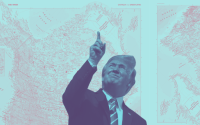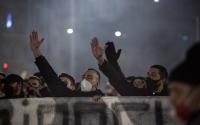It also involved, it is now clear, the deception of the British parliament and people, from the threat posed by Saddam Hussein to the content of the attorney general's legal green light for the war. To suggest it is somehow unreasonable or obsessive to dwell on these matters or hold those responsible to account is to negate the essence of democracy. One must hope that if any power were ever to do to South Shields what was done to Falluja, we would do more than carp about it.
There are four reasons why the Iraq war and the issues raised by it - the focus of this Saturday's anti-war march in London - deserve to remain at the top of the political agenda. First, we must bear witness to the fact that on every point, the 2 million people who demonstrated against aggression on February 15 2003 have been shown to be correct, while those making the case for the war have been proved disastrously mistaken at best, reckless liars at worst. Whether it was WMD, the legality of the war or the consequences for Iraq of foreign military occupation, those who marched knew better than our rulers. That is a democratic lesson that bears repetition.
Second, we must demand that the occupation is brought to a speedy end, our troops brought home, and full sovereignty restored to the Iraqi people. If you needed any further argument as to why the British and US military are utterly unfit to exercise control over Iraqis, surely the abuse of prisoners, photographed for posterity by their tormentors, provides it. The US-manipulated elections have done nothing to weaken the case for an end to occupation or Iraqis' overwhelming desire for thewithdrawal of British and American troops. If anything, the opposite is true.
Third, the "war on terror" is cutting closer to home than ever, with centuries-old civil rights being scrapped on grounds which closely resemble those used to promote the war against Iraq. The anti-war movement adopted defence of civil liberties as a key objective from the outset. We can neither place all our faith in peers, nor on ministers who believe it is acceptable for British Muslims to be targeted for stop-and-searches. We are proud that human rights campaigners like Liberty's Shami Chakrabarti and the former British ambassador to Uzbekistan, Craig Murray, are now sharing our platforms.
Fourth, the threat of new wars, including an extension of conflict in the Middle East to Syria or Iran has to be taken extremely seriously. The Washington neo-conservatives are brutally frank about their objectives and we must assume they will try to attain as many as possible, by force if necessary, over the next four years.
When George Bush demands Syrian troops leave Lebanon "because you cannot hold free and fair elections under foreign military occupation", it might be tempting to think he is indulging in self-parody. But experience suggests this administration is never so dangerous as when it sounds most absurd.
Already, the repeated mobilisation of British "people power" over the past three years has made it extraordinarily difficult for a British government to support any further wars. The war party has comprehensively lost the argument - that is presumably why, in recent months, it has turned to increasingly desperate attacks on the anti-war movement.
Some of the charges against us are true: we are proud to work with Muslims, many of whom have been brought into active politics for the first time. We recognise that an invaded people will resist occupation and has the right to do so. Many of our organisers are of the left, and defend its traditions against those who would prostitute them in the service of US power.
The anti-war movement has spoken the truth on behalf of millions of citizens - there should not be a single parliamentary candidate in the forthcoming election able to hide from it.
· Andrew Murray is chair of the Stop the War Coalition and author, with Lindsey German, of Stop the War - The story of Britain's biggest mass movement, published this week.






